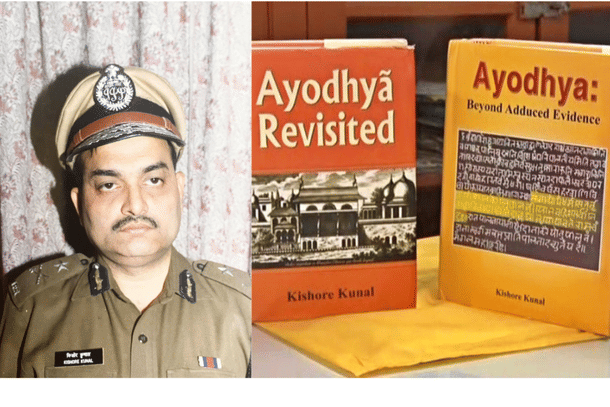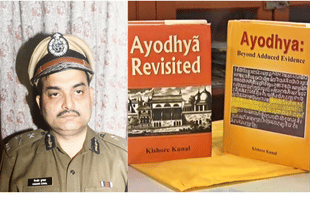Commentary
Supercop, Scholar, And Ram Bhakt: Acharya Kishore Kunal's Enduring Legacy
Abhishek Kumar
Dec 30, 2024, 07:12 PM | Updated Jan 02, 2025, 01:56 PM IST
Save & read from anywhere!
Bookmark stories for easy access on any device or the Swarajya app.


As one ventures out of platform number one of Patna Junction, a grand Mahavir Mandir, which is more than a century old, awaits the traveller.
After being declared public in 1948 by the Patna High Court, the temple largely remained poorly managed until the early years of the 1980s.
The story of its rejuvenation begins with a simple sleeper-class train journey of Acharya Kishore Kunal - one of the most iconic figures in Bihar's administration and socio-religious domain.
Acharya Kishore Kunal passed away in the early hours of 29 December, 2024, in Patna. He is widely regarded for establishing Mahavir temple in Patna, counted amongst the largest temples in the country.
In one of his old interviews, Acharya Ji revealed that during one of his journeys, he heard a few co-passengers talking about the poor state of Mahavir Mandir and Patna Medical College Hospital (PMCH). The summary of the conversation goes like this: “One who can improve Mahavir temple and PMCH is a real administrator.”
Acharya Ji was then Superintendent of Police (SP) in Rohtas, where he played a decisive role in ending dacoity. When he was sent as Senior SP (SSP) in Patna, his cultural roots and that conversation on the train reminded him to do something for the temple.
He began by asking local elites in Patna to join him, and it soon turned into a mass religious movement. As rejuvenation and new construction started to get noticed, commoners also joined in with whatever donations they could make. Big donations were submitted in bank accounts, while a donation box was there for smaller ones.
With time, its fame has witnessed exponential growth, and Mahavir Mandir Trust—of which Acharya Ji served as founder secretary—now operates several hospitals, including Mahavir Arogya Sansthan, Mahavir Cancer Institute, Mahavir Vatsalya Hospital, Mahavir Heart Hospital, Mahavir Netralaya (Eye), Vishalnath Hospital, and Mahavir Senior Citizens Hospital.
But the journey was not that easy.
Acharya Ji had to balance the physical, intellectual, and religious rigour of this task with his job as an IPS officer deployed for improving law and order in Bihar. Initially part of the Gujarat cadre, Acharya Ji came back to Bihar after discussions with Karpoori Thakur, former Bihar chief minister and recently a posthumous Bharat Ratna awardee.
His approach to work drew the ire of the corrupt face in the state. Acharya Ji remembers his Rohtas deputation as the 'real policing act' of his career.
At that time, around 300 dacoities per month used to take place in Rohtas. It was organised crime, and even the local police or different forces in the district on other duties were not able to help.
He prepared a crime directory and categorised criminals into three groups—dacoits, murderers, and rapists. This list was sent to the judiciary and officers. Officers were given a free hand to encounter these categories of criminals.
To stop vehicle (bus/car) loots, he asked policemen to travel in civil uniform and shoot dacoits at the moment when they anticipated such loots.
During his tenure, criminals were on the run, and by the time he left, Rohtas’ image massively improved. The daredevilry was good enough to earn him a transfer to Palamu, which was then known for mafia raj.
Its mafia culture has similar folklores, which people tend to attribute to Poorvanchai goons like Atiq Ahmed in Uttar Pradesh.
Many of the 'trouble makers' there were public representatives too, one of whom was Vinod Singh—who also served as a member of the legislative assembly. Acharya Kishore Kunal arrested him by pulling him off a government aeroplane. Singh was then accused in a total of 80 cases.
From Palamu, he was sent to the capital, Patna, where he wanted zero intervention from any of the existing political machinery. He was granted six months' time but executed his anti-crime operations within seven days. After operations by the police, many criminals left the capital city.
A highlight of his Patna tenure was the 'Bobby murder case'. Bobby or Shwetnisha Trivedi was the adopted daughter of Congress leader Rajeshwari Saroj Das.
When she died, Acharya Ji was coming back after establishing peace in conflict-affected rural areas. It was en route that he got a call from an Indian Express journalist regarding a high-profile murder.
By the time he arrived, Bobby was buried (she had converted to Christianity), and her death was dismissed as a simple suicide. Acharya Ji’s enquiry revealed that it was not a simple death, and therefore police dug up the grave for a postmortem, which established that Bobby was poisoned.
Acharya Ji was one of those police officers who not just solved crimes but was seen solving them. Many times he used to take criminals to lockups in full public view. These optics changed the way normal civil offenders looked at minor violations. For them, he used batons.
During his time, even rickshaw pullers started to keep headlights, auto drivers did not overload, traffic violations were minimal, students used to keep short hair and refrained from adopting dressing styles shown in movies. Legendary actor Pankaj Tripathi also explained one such event during his younger days.
The popularity also attracted some detractors. In Bihar’s power circle, it is common knowledge that Acharya Ji and the Lalu Yadav administration were in conflict with each other. He was seen as one of the few roadblocks in the way of 'Jungle Raj'. Yadav even pushed Deve Gowda for transferring Acharya Ji to another state, which failed.
Lalu Yadav was so frustrated with him that he wanted to take down Acharya Ji’s reputation and wished to appoint Ramai Ram—a Dalit—as pujari in the Mahavir mandir. But Acharya Ji had already done it by appointing a Dalit pujari from Ayodhya.
Yadav - in his capacity as chief minister - himself reached Mahavir Temple to destroy a few of its portions in the name of encroachment, but was met with huge public uproar.
Incidentally, later Acharya Ji helped save the life of Upendra Nath Biswas, who was handling the investigation of the fodder scam.
His police-day heroics have been chronicled in a famous book named Daman Taksho Ka.
Despite such heroics, Acharya Ji’s primary identity was of a religious and scholarly figure. His work on Mahavir temple in Patna made him an iconic figure in the state, paving the way for his appointment as head of the Bihar State Board of Religious Trust (BSBRT).
He is credited for appointing Dalit priests in other temples as well. He also renovated thousands of temples and banned the sale of plots reserved for temples.
Ramayan Temple in East Champaran, being constructed at the cost of Rs 500 crore, Garib Nath Mandir at Muzaffarpur, Chaturmukh Mahadev Mandir at Vaishali, Jagannath Mandir at Bodh Gaya, and Ram Chaura Mandir at Hajipur, among others, are a few of the famous temples in Bihar whose current form is credited to Acharya Kishore Kunal.
Nationally, he remained more in the news for playing a pivotal role in the restoration of Ram Janmbhoomi. His background in Sanskrit, understanding of and passion for history, religion, and law, and goodwill among the other side were crucial considerations in his appointment as Officer On Special Duty by V.P. Singh.
His OSD position continued under Chandra Shekhar and P V Narasimha Rao as well.
Throughout his life, Acharya Ji maintained that it was Marxist historians who were the main villains in the Ram Mandir issue as they leveraged their stature among willing Muslims to elongate the court case.
He had a crucial presence in court hearings too and submitted evidence in court, which was accepted by the Apex Court. He also published two voluminous books named Ayodhya: Beyond Adduced Evidence and Ayodhya Revisited. M. N. Venkatachaliah and G. B. Patnaik wrote forewords for his books.
These books are widely acclaimed for their factual accuracy and impartiality.
Acharya Ji was also a member of the Ram Mandir Trust. Under him, Mahavir Mandir donated Rs 10 crore for the construction of the Ram temple. The Mahavir Mandir Trust also runs a Ram Rasoi in Ayodhya, where it provides free food to pilgrims.
Born into a Bhumihar family in the Muzaffarpur district, he was admired among all social groups.
Till now Bihar has seen very few figures who drew praises from all quarters and were polymath when it came to social, scholarly and practical intelligence.
Acharya Kishore Kunal will also be counted as one of them.
Abhishek is Staff Writer at Swarajya.





